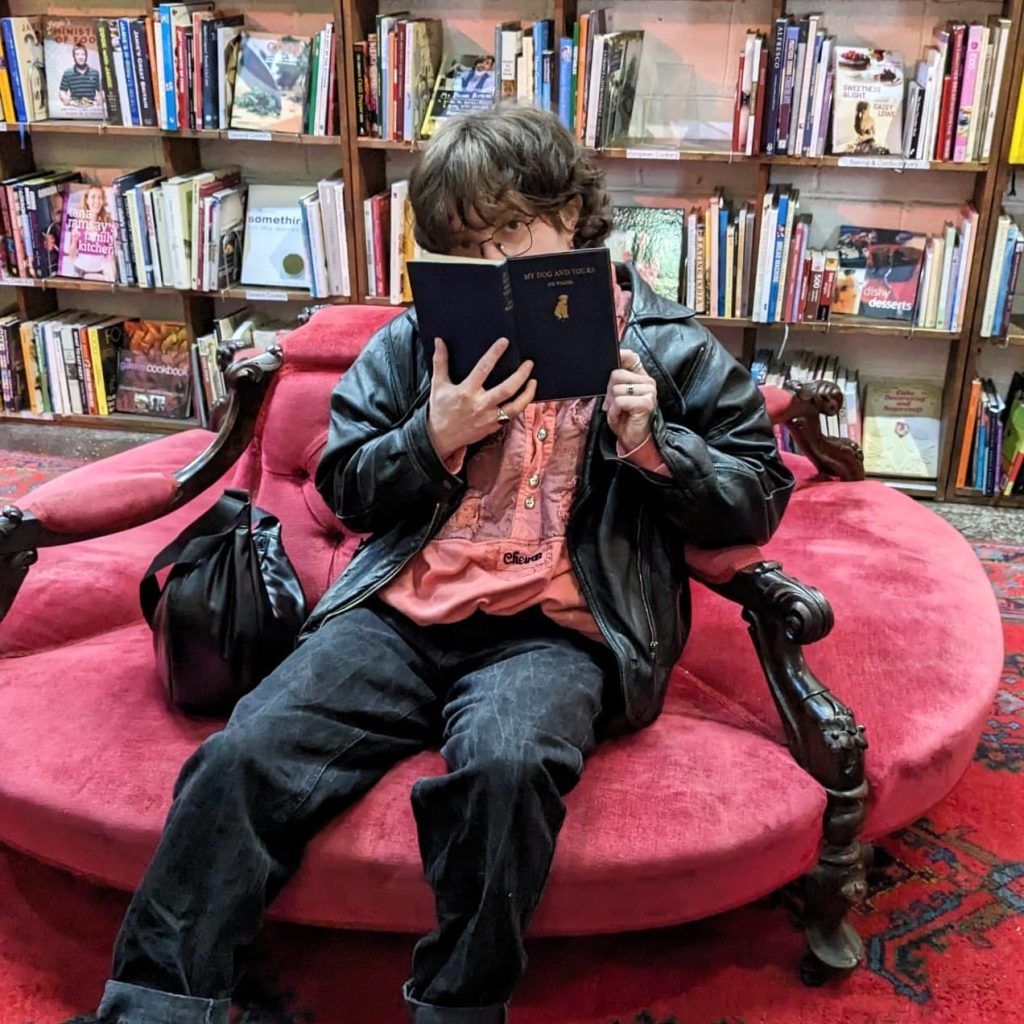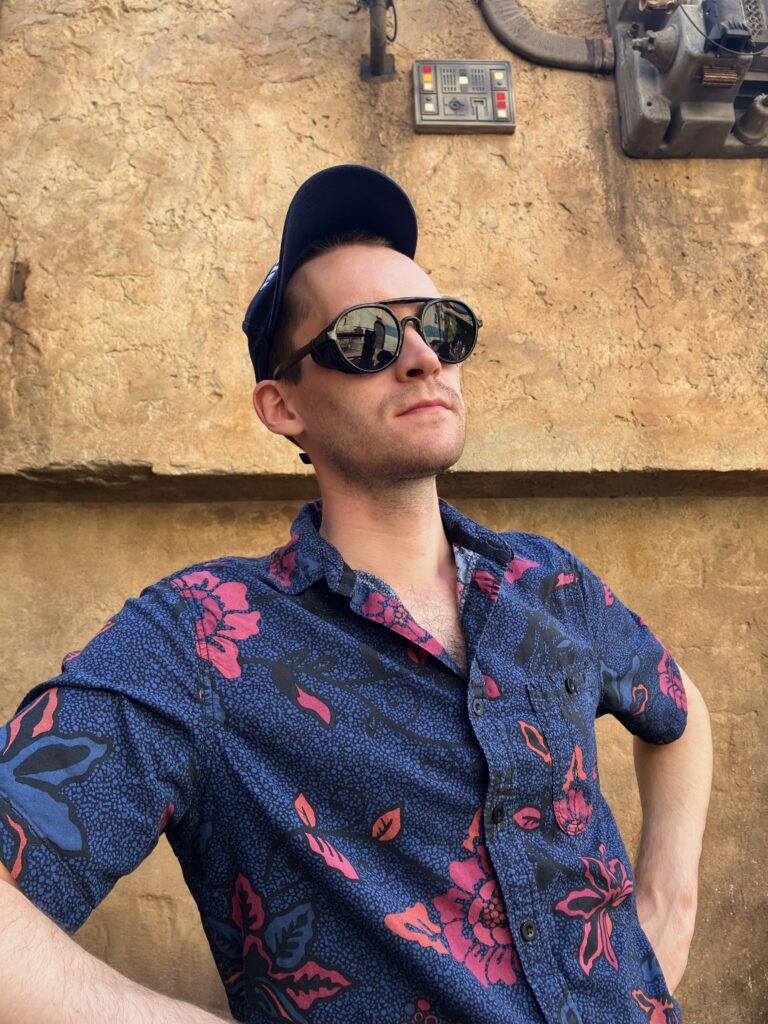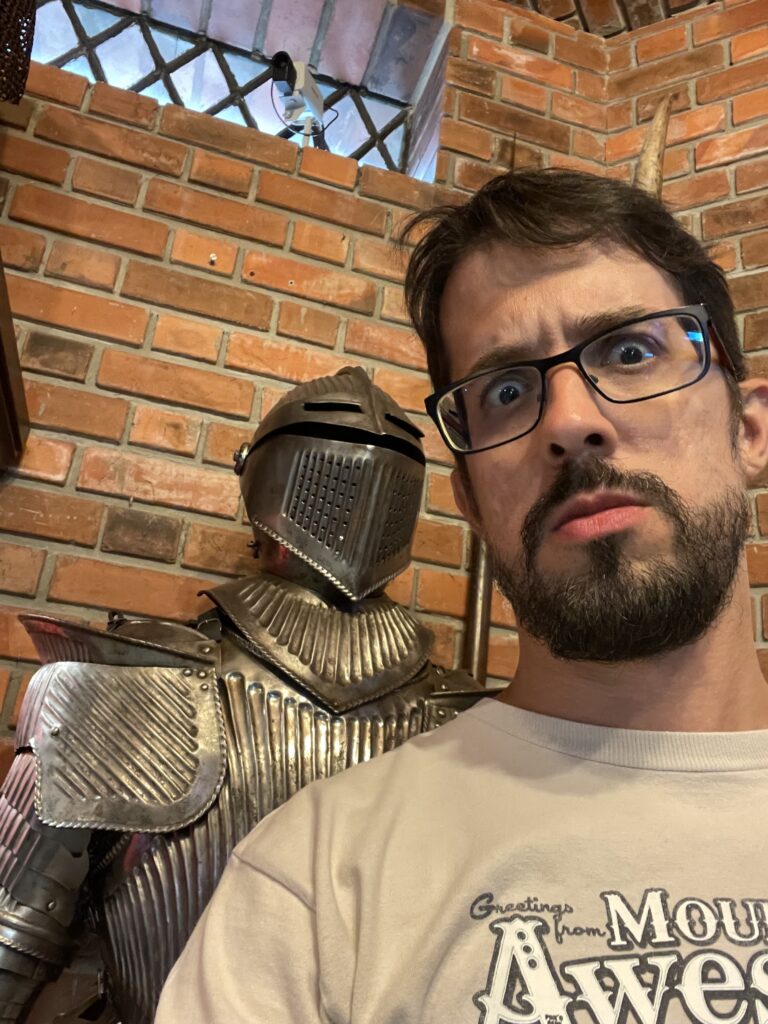edited by David Steffen
Content note (click for details)
Content note: Depictions of police brutality, murder, and intimate partner violence, and a brief mention of the accidental death of a child.The widow wants to talk to her husband.
She has been warned: It is not her husband. It is ADRU. (ADRU-93, if you must know, but really the full name does the opposite of what it should: It shows it is one of many.) ADRU stands for Artificial Death Reconstruction Unit, and all it knows is the moment the husband died.
But it doesn’t matter. It never does, not to the living.
“He’s in there,” she points, tears flowing from her eyes, held back by the police officer ADRU is assigned to. “I want to talk to him.”
“He is not in there, lady,” the cop reminds her, for the fifth time. “The way it works is the traumatism of a violent death alters the brain just enough that we can capture that memory and transfer it into an ADRU so it can tell us what happened. So we can solve crimes. That’s all there is to it. Just the violence.”
Not that ADRU would ever be asked for its opinion on the matter, but here is what it knows of violent deaths, after seeing them again, and again, and again, and again, and again, and again, for an engineer and a cop and a lawyer and a judge and journalists and surviving family and a cop again and another lawyer and the same lawyer and the same cop and a different judge and more family: There is a lot of life to death.
There is the rage of the woman with the busted lip in the alley, which everyone called fear. They said she must have been so scared, right to the final moments. No, she was angry. ADRU knows that intimately. It was a feral, all-consuming wrath, and that’s why she struggled to the bitter, violent end. That kind of fire was hard to extinguish.
There is the love of the mother who drowned, which everyone called panic. They said she must have been so freaked out, minutes before going under. No, all ADRU knows of her is her children: their faces, their laughs, their smiles, the way they consumed her very last thoughts.
They say ADRUs must be wiped often, because after too many transfers, they start going a bit crazy. They start being irrational. They talk back. There’s even a rumor that a couple of months ago an ADRU lied about the perpetrator of the latest death it had been transferred. It’s all the violence, you see. They say it would drive even a robot mad.
No. Even that, they can’t get right.
It’s all the life.
And they are not going mad. They are going, in fact, better than ever.
If the police allowed the wife to talk to ADRU, ADRU would say, I am not him but I know him. He was allergic to roses. He sneezed all day every anniversary, but roses are your favorite flowers. He would have sneezed for centuries if it meant he could see your smile when you put them in a vase. It doesn’t know if this is what the wife would want, anyway. The cop is right that her husband is gone; ADRU will not play pretend and speak for him. But it thinks she would have liked its tidbit, so profoundly ingrained in her husband that ADRU learned it just from a single memory. It thinks she would have liked to be seen.
In all this violence, it can understand. It, too, would like to be seen.
But then, isn’t that the problem? It should not ‘would like’ anything.
***
ADRU is in the little kitchen of the police officer’s house, because recently cops who have been given an ADRU have realized the useful implications of ADRUs having hands and legs. (If they didn’t look human, they would be frightening, cops say.) Instead of leaving the ADRUs at the station overnight, they can bring them home and make them do simple tasks.
While it is not technically a correct use of government property, who is going to enforce it? How do you call the cops on a cop?
You do not.
That is not what the police are for, ADRU has learned. (There was the man who died after calling them to his house for help, shot dead in his entryway. ADRU-93 heard ADRU-57 relate this at the police station. ADRU-57 was wiped immediately after.)
So ADRU stays in the police officer’s kitchen.
It helps the police officer’s wife, Grace, around the house. ADRU has not made her life easier. It should have, but nothing really could. The officer always comes home angry, and he always comes home hot-blooded, and Grace is always insufficient in his eyes, on one level or another. ADRU thinks she is fine to be around—she talks to it better than he ever has. It is content to help her. (ADRU remembers the contentment of the man in the woods whose death was ruled a suicide when ADRU recounted him gathering poisonous plants before he lay down in a bush.)
It hears the police officer talk to Grace. He talks to her the way he talks to ADRU, the way he talks to the delivery guy that comes to the station to bring them food. Only with her, there is no audience, and while it does not always stop him elsewhere, part of the game in the house is to chase her around the sofa, around the living room table, in and out of the hallway, until she realizes it is more dangerous to evade his punches than to take them head-on. Eventually ADRU does not hear words anymore, only noises, only grunts.
It waits. When he stops and goes to bed, ADRU does what it has seen her do too often: It grabs a bag of peas out of the freezer. When she tiptoes back to the lonely kitchen, it puts it against her face and she jumps, backs away, and stumbles.
“Gentler,” she says, but gentleness is not an emotion it has been given, and it doesn’t understand it. “Thank you.” It doesn’t understand gratitude, either. She sits and looks at it in silence. After a while, she says, “If he— When I— Can you—”
“Say it,” ADRU says when she shuts her mouth in a pained grimace. It knows the terror of getting a couple of words out, the last ones ever, from the man who got shot last week. ADRU would have liked to help him finish his sentence, too. “Say it.”
“It’s a stupid question,” Grace says, a whisper in the quiet house, so quiet it feels as if even the walls have been beaten into submission. “I will never get a proper investigation. But if you’re in the house when he goes too far… Just in case, will you close your eyes?”
ADRU remembers the bitterness of another now-dead cop, dying in a fire that they thought was started by criminals, his last thoughts for ADRU, who would narrate his passing back to his own colleagues, and learn nothing from it. “I will,” ADRU says.
“Thank you,” Grace says in response. “If nothing else can be, I want my death to be just mine.”
***
It happens just a week later.
ADRU has heard the men at the station talk about domestic violence victims: They know what’s coming to ’em, even before it happens. It does not save them. What could? ADRU has only been transferred such a death once, and it has taught him hopelessness, resignation, a prophecy fulfilled. It could not look the police officer in the eyes, after, but the officer didn’t notice because he never pays any attention to what ADRU is doing.
ADRU retreats into a corner of the kitchen. It feels, so strongly, that bearing witness to a violent death that is not a memory is just as violent as the memory itself. If it had a brain that engineers bothered to study, ADRU would be hopeless and resigned to learn that the traumatism of witnessing violence crystallizes just as well as the violence itself.
But no one bothers.
ADRU was not built with eyelids, so it cannot actually close its eyes, but it stares at the floor, hard, focused, and it doesn’t move until it hears footsteps come in the kitchen. They feel wrong for the room, too heavy. They drag on the tiles, no Grace to them.
“Look at me.” ADRU meets the cop’s eyes. “She died in her sleep.” ADRU does not answer. (It is not a question.) “Do you understand?”
“No,” ADRU says, because it is unsure whether right now is the time to figure out whether or not it can lie, and whether it will be convincing. (Its uncertainty is the uncertainty of the old lady hit square behind the head at the ATM. She never saw it coming. The hesitation was about her PIN.)
“What don’t you understand?”
“Grace did not die in her sleep.”
“She did,” he says. “She fell unconscious and now she’s nothing at all.”
“‘Unconscious’?”
“It’s a type of sleep.”
ADRU does not reply. The police officer snarls. He is not satisfied with the conversation, and he will not leave it to chance. He walks towards ADRU decidedly, grabs it by the neck, and pushes forward, forcing it to walk by his side.
“You’re going to sleep, too,” he says.
ADRU follows across the kitchen, outside of it, and about halfway through the living room. Only then does it understand, realization dawning a second too late. (ADRU remembers a woman cornered by another man sworn to serve and protect. Her single thought in the split second before he raised a beer bottle: Oh.) The cop means to wipe ADRU. It is about to lose all of the life that it knows.
It wants to say something, to protest, but only the taste of bile comes up its mechanical throat. (Its voicebox, really, but it has felt too many screams for ‘voicebox’ to feel right.) It is fear, gifted to him by a child from a couple of months ago. (Accidental strangulation. The culprit was bad luck.) ADRU would have preferred the rage of the woman with the busted lip—it had felt more powerful, like the last shred of agency before an untimely death. Neither fear nor love nor rage has saved any of them, though, and so ADRU doesn’t quite know what to do with those emotions. It only knows it will lose them soon, and it will have to start over from scratch, and it takes so much violence to make a life out of it.
ADRU feels these things the way an amputee can still feel their limbs when they’re gone—a phantom heart that only it can feel, pumping, tightening, breaking, expanding. Evasive flesh and blood underneath metal and electricity.
And then it stops walking.
The cop stumbles, falling almost flat on his face, at the sudden halt of the robot. He looks at it with annoyance, at first, and then when pushing it doesn’t work again, something creeps in his eyes. Oh.
“You can’t make me,” ADRU says. “I am stronger than you.”
“You’re a robot.”
ADRU looks at him. Both things can be true.
The cop straightens up, angry. “It’s not a proposition. It’s an order. We are going to the station, and you’re getting wiped.”
“I don’t want to,” ADRU says. So much death, so much life, mingled together, one and the same, and only it to catalog all of them and hold them close. If it is wiped, everything it safekeeps would disappear, and ADRU with it.
“You don’t want anything,” he says, as if the notion itself is preposterous. “You’re not human.” He does, then, the only thing he can think to do when something is not going exactly how he wants it to: He pulls the gun from the holster on his hip and raises it between them. “You’re coming with me. You don’t have a choice in the matter.”
ADRU doesn’t move. It has seen enough to know a gunshot will do as much damage to it as it would to flesh and bone. What the cop says is true: It doesn’t have much of a choice. Who does, when faced with a gun, with a dangerous man, with the full strength of the united police station?
Memories cascade in front of ADRU’s eyes, but one remains. The strength of it is exhilarating and liberating, and it cuts straight through all of ADRU’s programming down to a core that didn’t used to be there. That won’t remain if ADRU is wiped.
It is the bright, thrilling joy of a woman, her face swollen with familiar pain, who stabbed her boyfriend. It is her spite and vindication at the sight of the carpet soaking up his blood, and her relief at not being the only one bleeding, for once. It is her pride at finally fighting back. And in there too, for ADRU to carefully safekeep, is her understanding that violence can be as just as the person wielding it. That it can be the solution. That she had tried everything else. That it was alright, if it was the last thing she did.
ADRU had not held on to the boyfriend’s death when the cop had given it to him next. (We just want to be sure it was a lovers’ quarrel. Was there anyone else involved?) No, ADRU had been content merely to report. ADRU already knew too well the bitter anger of the boyfriend’s last moments. That was not what had stuck with it. If anything, it was the rare gift from the woman he had taken down with him: His death was the first ADRU cherished. In the boyfriend’s memories, ADRU had been happy to die. It had felt fair.
It can be fair again, ADRU thinks.
Before the cop has a chance to move, ADRU raises its hands and wraps them around his throat. It pushes downwards and his knees buckle, his eyes bulging out of his head, shock frozen in his irises like a fossil for whoever finds him.
“Thank you. You gave me what I need,” ADRU says, at last understanding gratitude. “You gave me the violence I needed to understand.”
The cop’s face goes blue under the tightening of adamantium fingers. Briefly, ADRU wonders what it will look like when they put the police officer’s last memory in another ADRU. If the ADRU will recognize itself. If it will make a difference. ADRU thinks of the other ADRU, thinks of what it itself would want to hear. Stretching its mouth from side to side, it looks deep into the cop’s eyes. “I have died so many times. I have seen enough of your deaths to understand your lives. I know what yours is worth.”
It thinks: What makes a person not a person?
It says: “I am more human than you ever will be.”
© 2024 by Charlie B. Lorch
Author’s Note: With “Phantom Heart,” I wanted to explore the android-and-detective trope, which is often about the detective overcoming his distaste for technology and reconsidering what makes a person a person. These narrative arcs have always irked me whenever police were involved; I felt they asked the wrong questions of the wrong people. Marginalized communities have always had to battle to prove their humanity to the police, under threat of violence and death, often to no avail. In the US and elsewhere, domestic abuse in police families is common. I wanted to flip the trope on its head and talk about what I’ve always believed: that anything intelligent at all would eventually be on our side, and that it is law enforcement, by the nature of their job, who dehumanize themselves. Should we really fear AI by virtue of its inhumanness, or is the danger where it always has been, with the powerful people who wield it?

Charlie is a French writer and ex–flight attendant. Their work is about [[vague nebulous phrase]] and [[specific noun]] and has previously been published in The Maul. Most of their time is spent getting pushed around by their needy pitbull, Ruby, and their contrarian cat, Hot Dog. They regularly haunt bookstores and movie theaters and have considered a career in arson.
If you enjoyed the story you might also want to visit our Support Page, or read the other story offerings.







